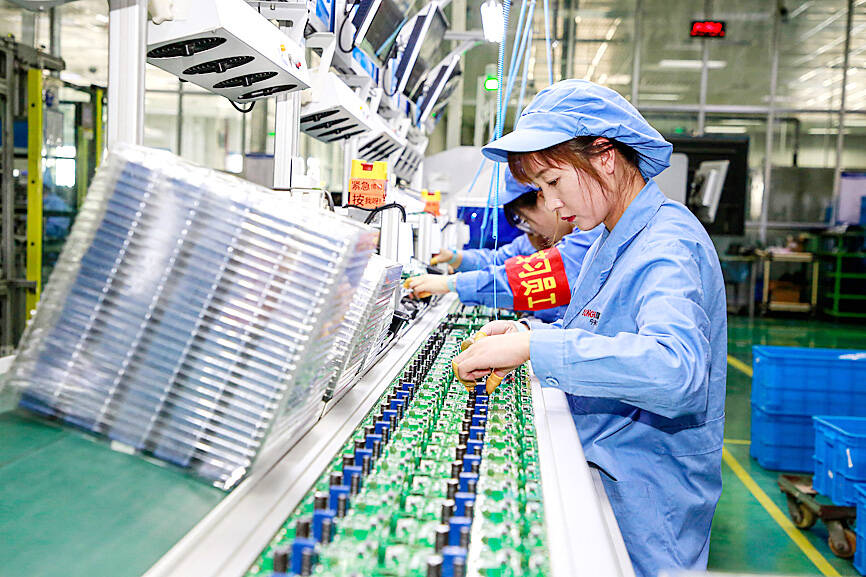New foreign investment into China slowed again last month, dealing a blow to policymakers’ efforts to attract more overseas capital to the world’s second-largest economy.
New actually utilized foreign investment into China was 102 billion yuan (US$14.1 billion) last month, according to calculations based on figures provided by the Chinese Ministry of Commerce yesterday. That was down 27 percent compared with the same month last year.
Efforts to convince overseas companies to return to China since the nation reopened after years of COVID-19 isolation are falling short. The continuing weakness highlights how foreign companies are putting less money into the nation due to geopolitical tensions and higher interest rates elsewhere.

Photo: AFP
The ministry in a statement accompanying the numbers said that fluctuations in investment data were normal, and the long-term outlook was strong with favorable conditions for investment.
Beijing’s efforts to woo back foreign capital has so far revolved around a series of action plans and warm language.
China in August last year announced a 24-point plan to address concerns, Chinese President Xi Jinping (習近平) promised “heart-warming” measures last year during a trip to the US, while this week the government unveiled another set of policies to further open up the Chinese market to foreign firms.
Officials on Wednesday said they had made progress on more than 60 percent of the 24-point plan at a news conference in Beijing, but foreign business groups have been more critical, saying they are still waiting to see how many of the pledges, which include better access to government contracts and relaxed regulations on transferring data overseas, are implemented.
There is also more incentive for multinationals to keep cash overseas, because advanced economies have been raising interest rates while Beijing has been cutting them to stimulate the economy.
New actually utilized foreign investment was 1.1 trillion yuan last year, 8 percent lower than the record in 2022.

With an approval rating of just two percent, Peruvian President Dina Boluarte might be the world’s most unpopular leader, according to pollsters. Protests greeted her rise to power 29 months ago, and have marked her entire term — joined by assorted scandals, investigations, controversies and a surge in gang violence. The 63-year-old is the target of a dozen probes, including for her alleged failure to declare gifts of luxury jewels and watches, a scandal inevitably dubbed “Rolexgate.” She is also under the microscope for a two-week undeclared absence for nose surgery — which she insists was medical, not cosmetic — and is

GROWING CONCERN: Some senior Trump administration officials opposed the UAE expansion over fears that another TSMC project could jeopardize its US investment Taiwan Semiconductor Manufacturing Co (TSMC, 台積電) is evaluating building an advanced production facility in the United Arab Emirates (UAE) and has discussed the possibility with officials in US President Donald Trump’s administration, people familiar with the matter said, in a potentially major bet on the Middle East that would only come to fruition with Washington’s approval. The company has had multiple meetings in the past few months with US Special Envoy to the Middle East Steve Witkoff and officials from MGX, an influential investment vehicle overseen by the UAE president’s brother, the people said. The conversations are a continuation of talks that

CAUTIOUS RECOVERY: While the manufacturing sector returned to growth amid the US-China trade truce, firms remain wary as uncertainty clouds the outlook, the CIER said The local manufacturing sector returned to expansion last month, as the official purchasing managers’ index (PMI) rose 2.1 points to 51.0, driven by a temporary easing in US-China trade tensions, the Chung-Hua Institution for Economic Research (CIER, 中華經濟研究院) said yesterday. The PMI gauges the health of the manufacturing industry, with readings above 50 indicating expansion and those below 50 signaling contraction. “Firms are not as pessimistic as they were in April, but they remain far from optimistic,” CIER president Lien Hsien-ming (連賢明) said at a news conference. The full impact of US tariff decisions is unlikely to become clear until later this month

Nintendo Co hopes to match the runaway success of the Switch when its leveled-up new console hits shelves on Thursday, with strong early sales expected despite the gadget’s high price. Featuring a bigger screen and more processing power, the Switch 2 is an upgrade to its predecessor, which has sold 152 million units since launching in 2017 — making it the third-best-selling video game console of all time. However, despite buzz among fans and robust demand for pre-orders, headwinds for Nintendo include uncertainty over US trade tariffs and whether enough people are willing to shell out. The Switch 2 “is priced relatively high”